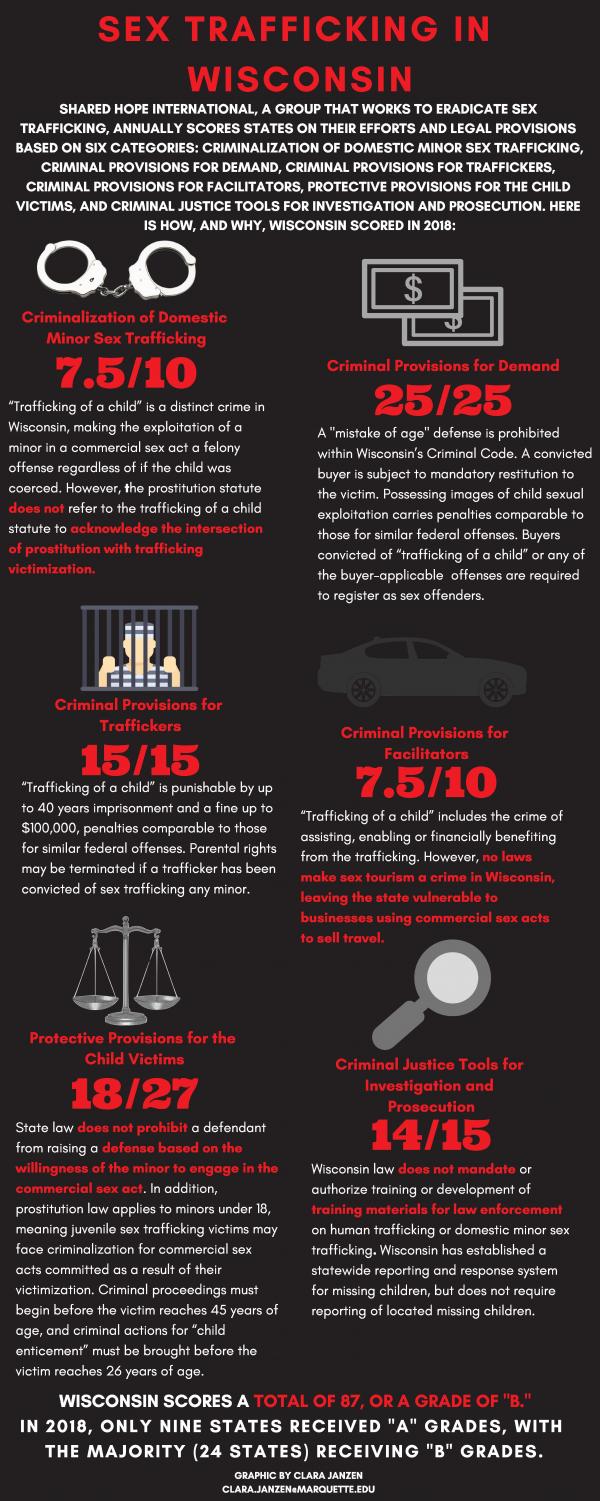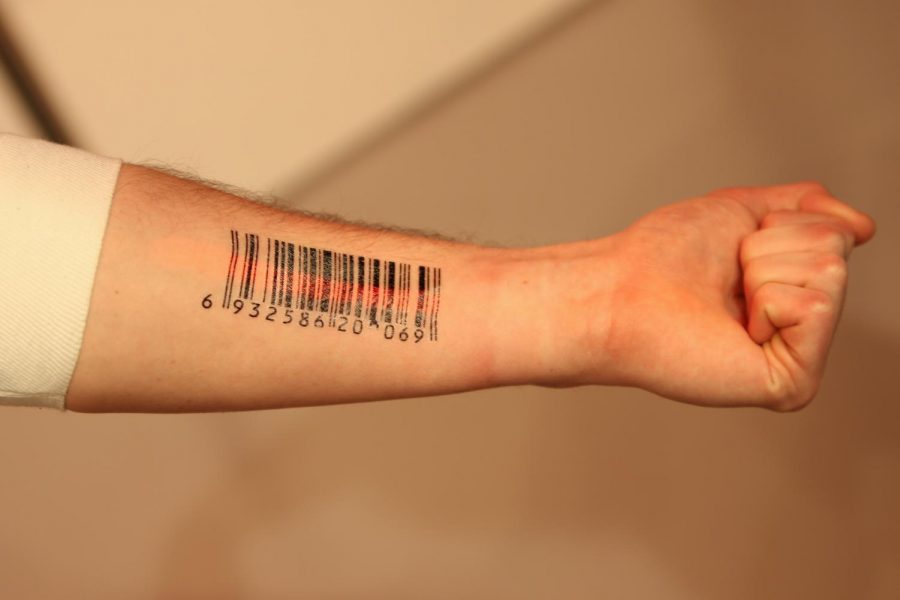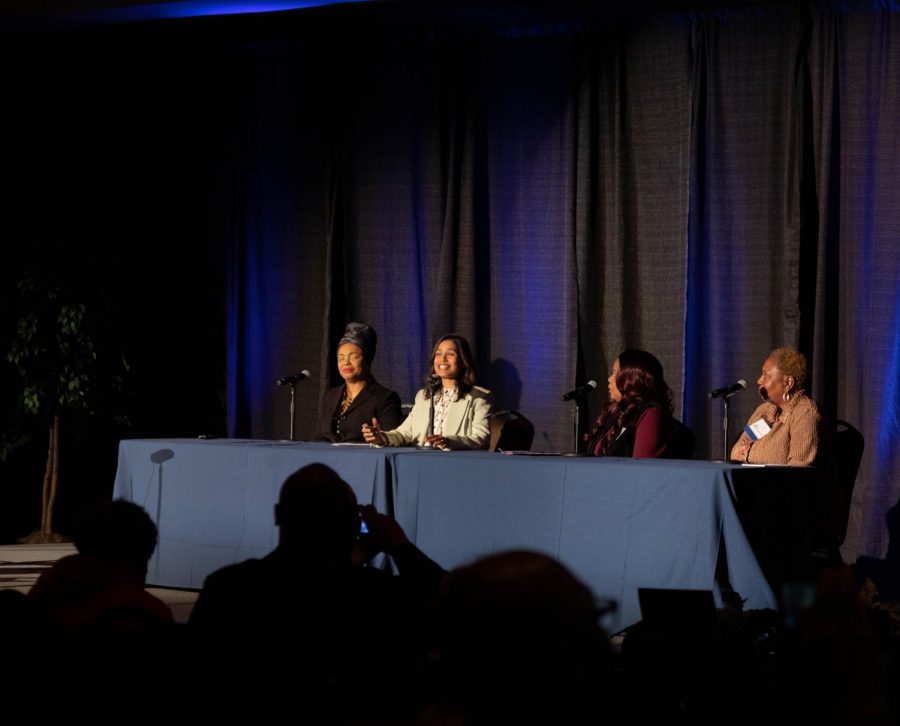Every October since 2012, Operation Cross Country, a program which aims to draw the public’s attention to the problem of sex trafficking, took place in various cities around the United States as a joint operation between local law enforcement and FBI field offices. Every October, that is, until 2018.
Operation Cross Country is a four day undertaking, where law enforcement sweeps cities in areas known to have trafficking problems and make substantial arrests. In 2017, the operation led to the recovery of 84 sexually exploited juveniles and the arrest of 120 traffickers nationwide. Of the 120 arrests, 82 were in Wisconsin.
The 2017 operation involved 55 FBI field offices and 78 FBI-led Child Exploitation Task Forces composed of more than 500 local law enforcement agencies. Every year hundreds of law enforcement officers take part in sting operations at hotels, casinos and truck stops as well as social media sites known to be frequented by pimps and their customers. Operation Cross Country is part of the FBI’s Innocence Lost National Initiative, which began in 2003. The program resulted in the identification and recovery of more than 6,500 children.
For every year Operation Cross Country took place, Milwaukee was chosen to participate. Not every large city participates every year, but Milwaukee was routinely invited back because of what happened the first year the sweeps were executed: Milwaukee tied with Las Vegas for the third most victims rescued and pimps arrested.
The fact that medium-sized Midwestern Milwaukee could produce the same numbers as a city with rampant gambling and prostitution was shocking to many. In addition, seven minors were among the recovered victims, the highest of any participating city.
When October 2018 rolled around and the media prepared for its annual coverage of Operation Cross Country in Milwaukee, it was left disappointed.
The Trafficking Victims Prevention and Protection Act, the landmark legislation from 2000 that is the base of federal human trafficking laws, expired in September 2017, leaving some programs and facets of federal agencies without allocated funding. Before the TVPA, states had their own protocols and laws, jurisdictions were unclear and agencies did not share data. No statement has been released as to the exact reason Operation Cross Country did not take place at all nationwide.
Before the first Operation Cross Country, Milwaukee already had a track record of issues with human trafficking.
The Human Trafficking Task Force of Greater Milwaukee traces its roots back to 2008, LaShawndra Vernon, co-founder and former chairwoman, says. Thanks to an impetus provided by U.N. Resolution 1325, which called for cosigners to devote increased resources to prevent violence against women and girls in their respective countries. The United States was on this list and the State Department began selecting cities to have independent audits of domestic trafficking.
Vernon was working with an organization called the Women’s International League for Peace and Freedom when she was contacted by the State Department. She said that WILPF was asked to find out what the community had to say about local trafficking.
“Milwaukee was chosen because it was a bit of a hub,” Vernon says. “It was a gateway between the larger cities in the Midwest and it was a place where they could hide the girls for a short time … and I should say not just girls. Boys were also impacted by this.”
Vernon says the founding members of the task force originally presented findings in a report on the state of trafficking in Milwaukee to the Milwaukee County Board, who allowed them to establish the task force independently. After their tenure with the county was up, they became included in city government through the Office of Violence Prevention, chaired by current task force member Reggie Moore.
“We started with a report,” Vernon says. “The state had done a report (in 2008) as well, but the report really identified that we were not tracking any of the human trafficking. So in our report we started talking about … these things we could track to prove the trafficking is happening and we could start using the definition authentically when we were taking people into our … intimate partner violence shelters and programs.”
Vernon says this was the key to getting more accurate numbers. Once the taskforce began getting more information, they could figure out which areas needed the most focus and could put resources there. The numbers, once they began coming in, warranted action.
“There was a study in 2010 that basically talked about 340 … children and young adults that have been missing over a three-year span,” Moore says. “That comes down to two children per week in our state.”
The task force has three central imperatives: coordinated services, education and awareness, and policy and legislation. Coordinated services provide resources to survivors of human trafficking and those who are still within the system. Education and awareness involves organizing events and disseminating information to the public.
The policy and legislation branch details its work in the state legislature to get anti-trafficking measures passed. This February, they went to Madison to speak to legislators door-to-door.
The task force is made up entirely of volunteers. There is no outside funding.
One of the key figures in the fight against human trafficking is Milwaukee Police Department Lt. Dawn Jones. Jones, who is retiring this March, has been involved in the arrests and convictions of several major Milwaukee traffickers. Derrick “Pimp Snooky” Avery was sentenced to 20 years in prison thanks to Jones’ work.

Jones says when she began looking for similar cases, she immediately found three open investigations. She says it was initially very difficult to get trafficking victims to come forward with information.
“Who … thought you could trust a law enforcement officer when you were being trampled?” Jones says.
She says working with trafficking victims has been the most rewarding assignment of her life. When talking about survivors whose lives she helps change, Jones says she is proud of their transformations.
“Think of nurses and CNAs and physical therapists in a society that a decade ago thought they were throwaway people and that it was their fault,” Jones says.
While the U.N. has dedicated tremendous resources to combating human trafficking, it has a checkered past with the issue. In the early 2000s, U.N. official Madeleine Rees, a lawyer by trade and the current secretary general of the International Women’s League for Peace and Freedom, was working on assignment in Bosnia. There, she began to uncover that U.N. peacekeepers and contractors were both directly involved with and helped cover up human trafficking in Bosnia. When she came forward with this information, she was dismissed by the U.N. until investigations revealed nearly a decade later she was right.
The State Department has released an annual Trafficking in Persons report every year since 2000 in which they detail the state of trafficking around the world by ranking countries on a three-tier system. A country in tier 1, like the United States, has passed legislation and made considerable efforts to reduce human trafficking within its own borders. A tier 2 country has made efforts, albeit unsuccessful, to address trafficking and has a considerable presence of trafficking. This would include countries like Turkey, Ukraine and Greece. A tier 2 watchlist country is at risk of becoming classified as tier 3. A tier 3 country has made little conscionable effort in addressing trafficking.
Legislative countermeasures also found their way to the floors of the House and Senate.
The National Defense Authorization Act of 2013, introduced by Rep. Buck McKeon (R-Calif.), made it possible for the government to cancel grants and contracts with any organization or individual found to have been involved in human trafficking without penalty. It is also stipulated in section 1703 of the bill the recipient of any contract or grant doled out in excess of $500,000 must have implemented anti-trafficking plans and procedures.
The Customs Facilitation and Trade Reauthorization Act of 2009 placed a prohibition on the import of any goods which were produced by human trafficking on an international scale. Despite this, America still has trade deals in place with tier 3 countries like Russia and China.
The Women, Peace and Security Act of 2017, introduced by Sen. Jeanne Shaheen (D- New Hampshire), mandated anti-trafficking training for members of the State Department and the Department of Defense. When President Donald Trump signed this bill into law, the administration agreed to submit a Women, Peace and Security Strategy a year later. As of the writing of this article, this strategy is not available to the public and no statements have been made concerning whether it has been submitted. This legislation replaced the long-standing National Action Plan on Women, Peace and Security which was enacted via executive order by President Obama in 2010. Both the WPS and NPA were byproducts of UN Resolution 1325.
Trump signed the reauthorization of the Trafficking Victims Protection Act Jan. 9, and said in his 2019 State of the Union Address that the United States has a commitment to fighting human trafficking.
Previous iterations of the reauthorization acts have adapted the legislation to challenges in enforcement. The 2003 reauthorization, for instance, included human trafficking charges on the list of federal crimes that can be charged under a Racketeering Influence Corrupt Organizations (RICO) predicate. The 2008 reauthorization expanded the definitions of trafficking to aid in convictions. And the 2013 reauthorization provided extra assistance to state and local enforcement agencies.
Even with all of these changes at the federal level, work remains to be done. The Human Trafficking Taskforce of Greater Milwaukee continues its efforts in Milwaukee, actively trying to erase the reputation of Milwaukee as the “Harvard for pimp schools,” as coined by current task force chairwoman Dana World-Patterson.
“Let’s just stick with the facts and continue to raise the issue that human trafficking must be eradicated,” World-Patterson says.





